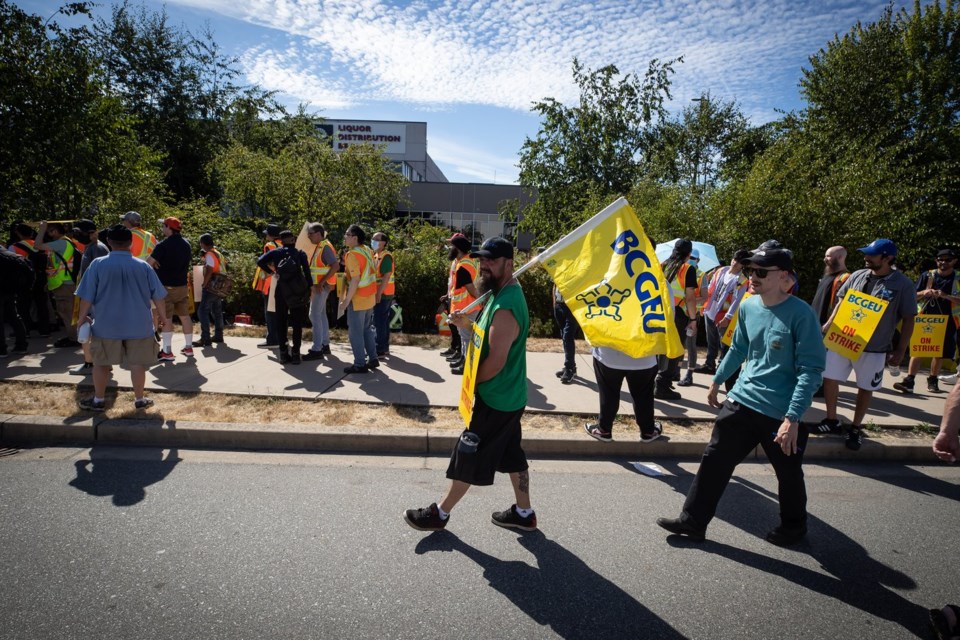As thousands of British Columbia government workers hit the picket lines Tuesday, the province's finance minister said there had been communication with the union to convince its team to come back to the bargaining table.
Brenda Bailey said representatives from the province and B.C. Government Employees' Union were meeting to "explore opportunities" to get back to talks to reach a new collective agreement under its so-called balanced measures mandate.
But the head of the union said it was "unacceptable" that the government wanted them back at the table without bringing an improved wage offer.
About two thousand members of the BC General Employees' Union set up picket lines and tables with coffee and doughnuts for workers in front of provincial government offices in Victoria, Surrey and Prince George as well as in front of the Royal BC Museum.
Union president Paul Finch said the first day of job action by workers would be mostly "inwards looking," but there were some disruptions for residents trying to get driver licensing services at an ICBC facility in Surrey.
Finch said pickets would remain up "as long as it takes" for workers to secure a deal that adequately addresses their rising affordability concerns.
"British Columbians in this province deserve good quality public services," he said. "Government is falling short of the mark. We know that. We are here to fight for that, and we are not going to go away until we have won."
Finch told about 200 union members in front of a Victoria government office building that it is "not an easy thing to take job action" as he accused the government of being out of touch.
"But I want to be really clear," he said. "We have a common resolve that we are going to fight for fair wages and we're going to continue to escalate."
The BCGEU has about 34,000 members in public service positions, including BC Wildfire Service workers, correctional officers and sheriffs, liquor and cannabis staff and more than 14,000 administrative professionals.
The government has said essential services will be unaffected buy the job action.
Finch said the union did receive a call from government.
"We asked them if they intended to come to the table with an enhanced wage mandate or a revised wage mandate. They said 'No,'" Finch said. "We said that is unacceptable. They need to come forward and negotiate with us. They haven't committed to do that."
Bailey wouldn't reveal government's offer to the union in an interview on Tuesday, but described the balanced measures mandate as focused on finding a "fair agreement" that supports workers and British Columbians during this "very challenging time, economically."
The balanced measures mandate is a framework for contract negotiations that the government says supports key spending priorities while striving "to maintain labour stability in a complex round of bargaining."
A framework deal was struck last week under the mandate with the Facilities Bargaining Association representing hospital workers and others. The deal has not yet been ratified.
Finch said that when negotiations broke off with the BC Public Service Agency in July, the union had been seeking a four per cent general wage increase in the first year and 4.25 per cent in the second year, as well as an unspecified cost-of-living adjustment.
Also looming over the dispute is the question of whether the union's demands are reconcilable with the province's fiscal state.
Bailey said the province is facing "very significant fiscal headwinds."
Figures released last month put B.C.'s deficit for the 2024 fiscal year at $7.3 billion, $564 million lower than was projected in Budget 2024. Provincial debt has also climbed to almost $134 billion.
Finch said the civil service should not be blamed for B.C.'s fiscal situation, or the "poor governance, overspending on capital projects, tax breaks for the wealthy, tax breaks on key resource projects that every British Columbians should be receiving benefits from."
When asked about Finch's comments, Bailey said "finger-pointing" would not help understand the context shaping talks.
"This is about a very challenging situation that is happening globally."
She said B.C. faces a global crisis evident everywhere.
"I just differ in terms of the analysis of what the challenges are," Bailey said.
Finch said in a statement that workers are "facing an affordability crisis," and their job action is a declaration that the latest offer from the province is "unacceptable."
"These same people who are struggling to make ends meet have voted overwhelmingly to strike," Finch says, adding the members are "willing to fight for the deal that they need.”
The union's previous collective agreement expired on March 31. Finch announced on Friday that a strike vote had achieved 92.7 per cent support, and a 72-hour strike notice was issued. It expired Tuesday morning.
This report by The Canadian Press was first published Sept. 2, 2025.
Chuck Chiang and Wolfgang Depner, The Canadian Press



